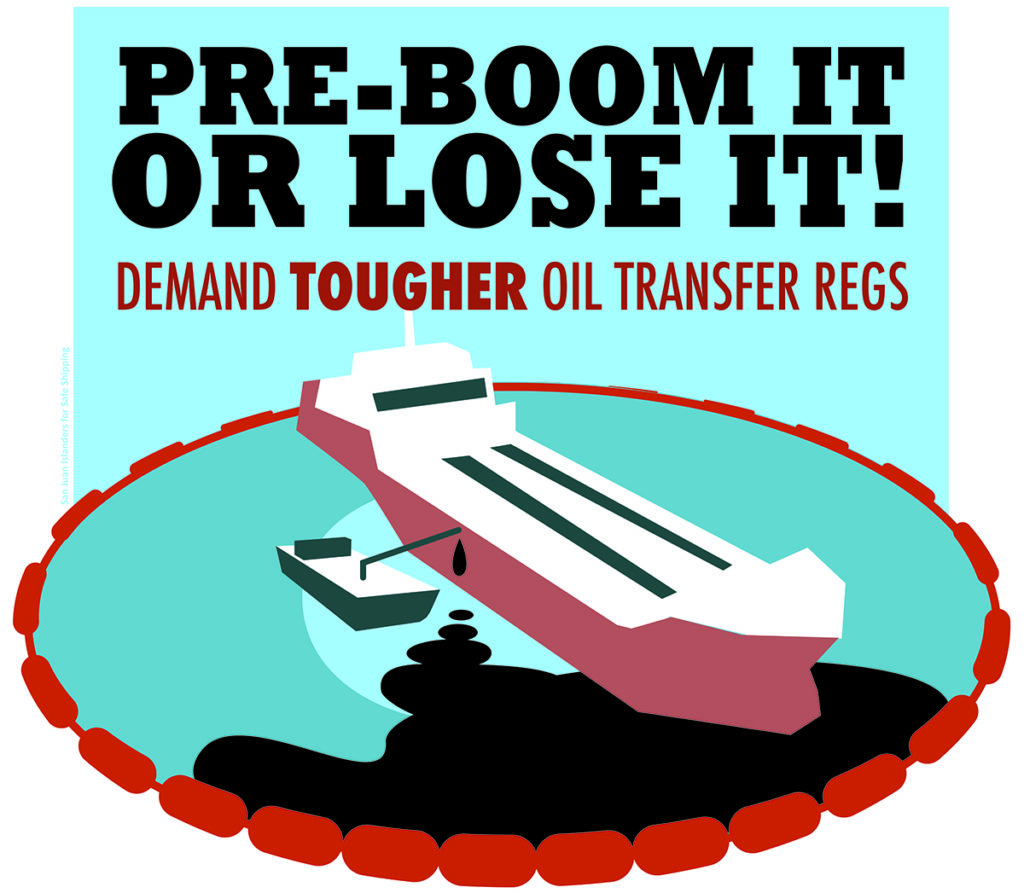We have an opportunity for you to help Southern Residents, salmon, and all the inhabitants that rely on a healthy Salish Sea!
The Washington Department of Ecology (Ecology) has issued a draft rule to reduce threats to Southern Resident killer whales by improving the safety of oil transportation.

As a result of a devasting oil spill in 2003 during an oil transfer operation in the middle of the night, Washington State enacted requirements for advance notice of oil transfer operations. Receiving notification of oil transfer operations before they occur helps Ecology regulate these activities and have the information needed for spill response. Regulations were also created for pre-booming oil transfer operations. Pre-booming is an important oil spill mitigation measure—if a spill happens, it is contained and more easily collected before it can cause extensive impacts. Pre-booming is prohibited for highly volatile products, like gasoline, that are an explosion hazard when contained in boom.
Ecology’s draft rule will update some of the requirements for oil transfer operations and reporting requirements.
Unfortunately, the rulemaking doesn’t address the fact that pre-booming is only required for oil transfer operations that occur at transfer rates greater than 500 gallons per minute—a loophole too big to let stand!
This draft rule will also:
- establish new decommissioning requirements for out-of-service oil storage tanks and oil transfer pipelines;
- require additional seismic protection measures to help prevent oil spills during earthquakes; and
- require seismic updates for all transfer pipelines and storage tanks, regardless of when they were constructed, but not secondary containment systems. Note that most of the state’s refinery and bulk oil handling facilities’ secondary containment systems were built before 1994, and they pose an unacceptable threat in the event of an earthquake.
Please take a moment to urge Ecology to reduce threats to our marine ecosystem from oil transportation and earthquakes!
Comments must be submitted by March 5, 2023.
Here are the steps:
- Personalize the suggested comments below.
- Submit your comments via this Public Comment Form.
- You can also mail your comments, postmarked by March 5, to:
Brittany Flittner
Department of Ecology
Spill Prevention, Preparedness, and Response Program
PO BOX 47600
Olympia, WA 98504-7600
Thank you for taking action to improve earthquake preparedness and the safety of oil transportation!
Suggested comments:
I support the new decommissioning requirements for out of service oil storage tanks and oil transfer pipelines, requiring additional seismic protection measures for oil storage tanks and transfer pipelines to help prevent oil spills during earthquakes, and updating the requirements to mitigate the impacts of spills from oil transfer operations.
To implement ESHB 1578, Reducing threats to southern resident killer whales by improving the safety of oil transportation, this rule should also:
- Require all secondary containment structures (that prevent spilled oil from reaching waters of the state) to withstand seismic forces;
- Require all oil transfer operations to be pre-boomed (when safe and effective to do so) and eliminate the Rate B loophole that allows oil transfers at 500 gallons per minute or less to occur without pre-booming;
- Restrict all oil transfer operations to daylight hours or, at the very least, restrict all oil transfer operations to daylight hours when it’s not safe and effective to pre-boom.
Learn more about this rulemaking and the suggested comments.
If you want guidance on your written comments and/or testimony, you can contact Lovel Pratt, Marine Protection and Policy Director at Friends of the San Juans.
